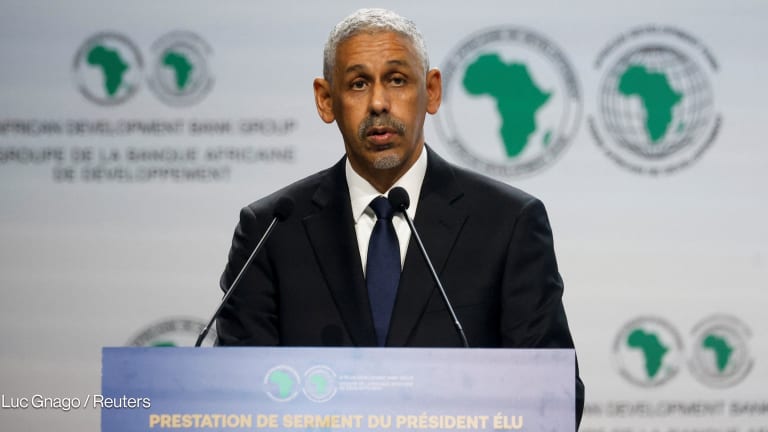
ABIDJAN — The 2018 African Development Bank’s Annual Meetings kicked off in Busan, South Korea, on Monday, with a focus on accelerating Africa’s industrialization, which many are betting on to drive sustainable economic development on the continent.
Increased investment in agriculture, industry, manufacturing, and processing has been a mainstay of programming under the African Development Bank’s “High 5” agenda, and will be the focus of conversations during this week’s meetings, which run through Friday. An estimated 4,000 delegates representing 80 countries have convened for the event.
AfDB's Adesina pushes an all-hands 'High 5' approach to African development
AfDB President Akinwumi Adesina sits down with Devex to discuss how he plans to achieve his "High 5" agenda strategy. His five priorities include Light Up and Power Africa; Feed Africa; Industrialize Africa; Integrate Africa; and improve the quality of life for the people of Africa.
“We have a rapidly growing young population, and an increasing demand for consumer goods, foods, and financial services. Together these factors make Africa an attractive business and industrial proposition for the private sector,” AfDB President Akinwumi Adesina wrote ahead of the meetings.
AfDB has six flagship programs aimed at fulfilling the Industrialize Africa pillar of the High 5 agenda. These include fostering industrial policies and developing industrial clusters, scaling financing to small and medium enterprises, and facilitating links to potential partners and investors.
Many conversations at the annual meetings will be guided by the findings of the 2017 Industrialize Africa report, which focused on strategies, policies, institutions, and financing to produce inclusive and sustainable structural transformation on the continent. The report estimated that roughly 16 percent of all jobs globally were in the manufacturing sector in 2013. However, even as higher income countries move away from manufacturing, the industry remains untapped in Africa, which is home to only 2 percent of the world’s manufacturing jobs, compared to 65 percent in Asia.
On Monday, during a session titled “Bridging Innovation and Industry: African Youth Solving Continental Challenges,” Adesina urged increased support for young entrepreneurs whose energy must be “nurtured and harnessed to propel Africa’s industrial revolution.”
The week’s meetings will explore topics ranging from value-for-money approaches, to boosting domestic resource mobilization in order to finance industrialization, and nontraditional financing instruments. Korean counterparts will also share experiences on how the country moved from low- to high-income without the benefit of natural resources to support its industrial period.
Panel sessions will examine how Africa can adapt its educations systems to suit new realities, particularly for industrial development, and how to attract ICT-focused investments to build out digital markets.
Alongside the annual meetings, AfDB will co-host the Korean-African Economic Cooperation Conference, which will focus on expanding public-private partnerships. Insiders at the bank have hinted that a commitment from the Korean Export-Import Bank may be announced.
Devex is on the ground at the AfDB Annual Meetings in Busan. Follow reporter @KelliErin for updates, and stay tuned for Devex coverage throughout the week.








